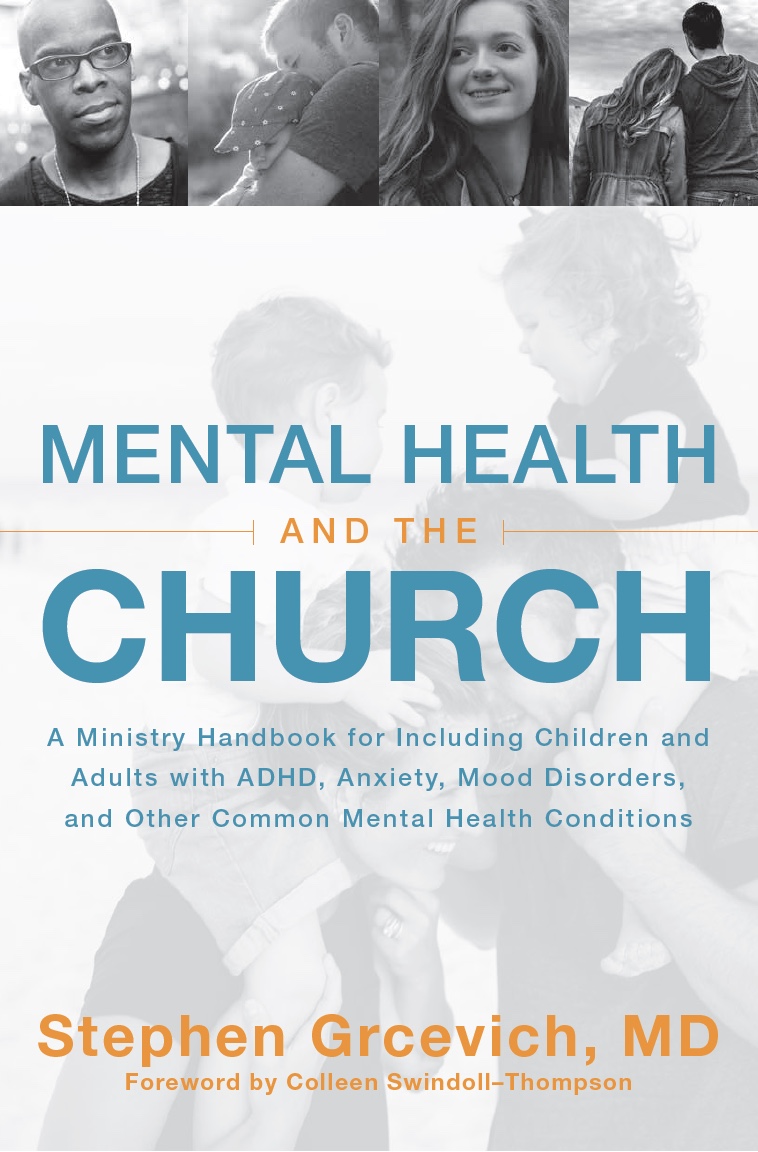 Adrian Warnock is a Christian author who serves on the leadership team at Jubilee Church in London. He writes a widely circulated blog on the evangelical channel at Patheos.com. I’ve messaged back and forth with him a few times because we have a couple of things in common that are extremely unusual in the evangelical church… We’re both physicians trained in psychiatry (Adrian with adults, I see kids) and we’ve both been involved with research.
Adrian Warnock is a Christian author who serves on the leadership team at Jubilee Church in London. He writes a widely circulated blog on the evangelical channel at Patheos.com. I’ve messaged back and forth with him a few times because we have a couple of things in common that are extremely unusual in the evangelical church… We’re both physicians trained in psychiatry (Adrian with adults, I see kids) and we’ve both been involved with research.
Adrian was invited by Patheos to facilitate a broad conversation about mental health to include bloggers from outside the Patheos community. He’s posed a couple of questions for discussion this week I found worth tackling for Mental Health Month…
How has your religious community historically seen mental illness?
How does your faith, today, shape the way you see mental illness?
I’ll look at the first question today, and the second question tomorrow.
 I think the perception of mental illness varies widely from denomination to denomination, and even more so between churches within a specific denomination. From where I sit, the attitudes of the senior leadership in any given church greatly influences the experience of families impacted by mental illness in that particular church. When the senior pastor “gets” mental illness or a family involved with leadership is impacted by mental illness, the church culture is more likely to be accepting and supportive.
I think the perception of mental illness varies widely from denomination to denomination, and even more so between churches within a specific denomination. From where I sit, the attitudes of the senior leadership in any given church greatly influences the experience of families impacted by mental illness in that particular church. When the senior pastor “gets” mental illness or a family involved with leadership is impacted by mental illness, the church culture is more likely to be accepting and supportive.
The two churches I’ve attended as an adult (one Presbyterian, one non-denominational) have been very proactive in providing well trained pastors and professionally trained counselors to help support the needs of individuals and families not just in the church, but in the surrounding community as well. Both operate large and vital respite care programs serving families of kids with disabilities, the majority of whom have mental health diagnoses. The efforts of our home church to support families who adopted children from Eastern Europe with severe emotional and developmental disabilities led to the development of Key Ministry. I served on the Catholic Charities Services Board that oversaw delivery of millions of dollars in mental health services to residents of Northeast Ohio, and my first job out of training was as the medical director of the largest adolescent residential treatment center in the state of Ohio, also operated by Catholic Charities. I’ve seen the church pool resources to meet very significant needs for kids with mental illnesses and their families.
From where I sit as a child and adolescent psychiatrist, there are two areas in which the church has the greatest potential for growth in ministering to families impacted by mental illness…
 First, the church has made MUCH more progress in recognizing the signs of mental illness in adults and providing appropriate support than it has for children or teens. Mental illness in kids often manifests with anger, moodiness, irritability, aggression, defiance, and difficulties with self-regulation of emotion and behavior. It’s much more common in my experience for the signs of mental illness to be dismissed as a parenting problem as opposed to a spiritual problem. There was a family who shared their experience in looking for a church home with two young boys with severe ADHD…the mother summarized their experience with this statement…
First, the church has made MUCH more progress in recognizing the signs of mental illness in adults and providing appropriate support than it has for children or teens. Mental illness in kids often manifests with anger, moodiness, irritability, aggression, defiance, and difficulties with self-regulation of emotion and behavior. It’s much more common in my experience for the signs of mental illness to be dismissed as a parenting problem as opposed to a spiritual problem. There was a family who shared their experience in looking for a church home with two young boys with severe ADHD…the mother summarized their experience with this statement…
“People in the church think they can judge when a disability ends and bad parenting begins.”
Lots of churches in our area have the ability to offer free or low-cost counseling to adults struggling with common conditions including anxiety and depression. In my experience, it is extremely rare for churches to offer resources to help children experiencing symptoms of mental illness, with the exception of respite care available for parents of kids with “special needs.”
Second, the church has missed a tremendous opportunity to reach out to and share the Gospel of Jesus with an enormously underserved people group.
While I can’t cite a specific, well-designed study looking at rates of church attendance and participation among families impacted by mental illness, I’d hypothesize (based on 27 years in the field of psychiatry) that kids and adults with mental illness are significantly less likely to attend weekend worship services or to be actively involved in small groups, Bible studies or serving ministries compared to the general population.
 People with mental illness don’t fit neatly and cleanly into our ministry “silos.” Most kids or teens with mental illness would never think of themselves as having “special needs” or as being “disabled”, nor would their parents think of a disability/special needs ministry as having something to offer them. Adults who suffer from Bipolar Disorder, recurrent depression and many types of anxiety often experience extended periods of relatively symptom-free functioning, and are less likely to be defined by their mental illness in comparison to adults with outwardly apparent disabilities or those participating in 12-step programs. Adults and kids who suffer from anxiety often avoid services tailored to meet their needs because their condition often leads them to misinterpret the level of risk in new situations and misperceive the way their acceptance of services offered to them is viewed by others in the immediate environment.
People with mental illness don’t fit neatly and cleanly into our ministry “silos.” Most kids or teens with mental illness would never think of themselves as having “special needs” or as being “disabled”, nor would their parents think of a disability/special needs ministry as having something to offer them. Adults who suffer from Bipolar Disorder, recurrent depression and many types of anxiety often experience extended periods of relatively symptom-free functioning, and are less likely to be defined by their mental illness in comparison to adults with outwardly apparent disabilities or those participating in 12-step programs. Adults and kids who suffer from anxiety often avoid services tailored to meet their needs because their condition often leads them to misinterpret the level of risk in new situations and misperceive the way their acceptance of services offered to them is viewed by others in the immediate environment.
The church has had a hard time understanding how persons with mental illness experience conditions that represent disabilities in some environments, but not others. The environments in which we “do ministry” present major impediments to people with common mental illnesses who may function reasonably well in other life activities. Let me cite an example…
Consider the obstacles your ministry environments would pose to a family in which the mother has moderate to severe symptoms of Social Anxiety Disorder (according to the National Institute of Mental Health, anxiety disorders are the most common mental health disorder in the U.S., affecting 18% of the adult population, or 40 million people)…
- She’s less likely to have friends to invite her (and the family) to church.
- The prospect of going somewhere for the first time where most people are strangers (and some will likely approach her to initiate conversation) may feel overwhelming.
- She’s likely to fear how she’ll be perceived if her child becomes distressed.
- If she becomes confused during her early experiences, she’s likely to have difficulty approaching a volunteer to help.
- She may find the invitation to introduce herself to others during the worship service heightens her experience of anxiety.
- She may struggle with making a follow-up call in response to an announcement in the bulletin to register her child for an activity, or to volunteer to serve in the church.
- The prospect of having to self-disclose in a small group study may lead to avoidance of small groups.
I just started reading Andy Stanley’s new book, Deep and Wide, with the subtitle “Creating Churches Unchurched People Love to Attend.” What if the environments in which we “do church” are distressing to large segments of our population who struggle with common mental illnesses? And what about the family members of a child or adult with a mental illness who miss out on learning about Jesus or growing in faith in Jesus because attending church or belonging to a small group or participating in a service ministry is too overwhelming to their brother or mother? It’s not unreasonable to assume that a significant chunk of people in any given community have some experience of church but don’t regularly attend church because of the subtle, but real ways in which mental illness presents a barrier to the environments in which we do ministry.
To reach people no one else is reaching, the church will need to try stuff no one else is trying. The more church leaders understand about the experience of kids and adults with mental illness, the better equipped the church will be to create ministry environments where all people can come to investigate the claims of Jesus and grow in faith in Him.
Updated July 4, 2014
***********************************************************************************************************
 Key Ministry has assembled resources to help churches more effectively minister to children and adults with ADHD, anxiety disorders, Asperger’s Disorder, Bipolar Disorder, depression and trauma. Please share our resources with any pastors, church staff, volunteers or families looking to learn more about the influence these conditions can exert upon spiritual development in kids, and what churches can do to help!
Key Ministry has assembled resources to help churches more effectively minister to children and adults with ADHD, anxiety disorders, Asperger’s Disorder, Bipolar Disorder, depression and trauma. Please share our resources with any pastors, church staff, volunteers or families looking to learn more about the influence these conditions can exert upon spiritual development in kids, and what churches can do to help!





Great insights in this article. Thanks so much for sharing your expertise. Evangelical churches need to hear more and more wisdom and professional perspective from people like you.
LikeLike
Pingback: How has Faith shaped the way we see mental illness?
Hope you send this along to Adrian Warnock as well as posting it here as it is very insightful – no surprise! Thank you for sharing from your knowledge and experience!
LikeLike